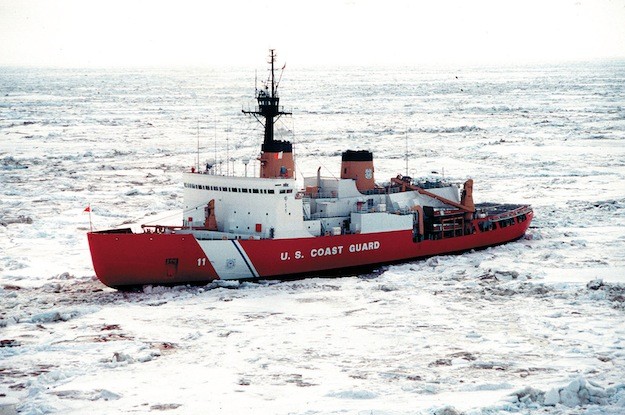The Harsh Reality of US Coast Guard Migrant Policy
by John Konrad (gCaptain) When merchant and cruise ships rescue migrants at sea, they offer more than just a lifeline from the perilous waters; they provide critical sustenance and care....


Washington, DC – The Subcommittee on Coast Guard and Maritime Transportation, chaired by U.S. Rep. Frank A. LoBiondo (R-NJ), held a hearing last week to examine the U.S. Coast Guard’s role and operations in the Arctic. The Subcommittee reviewed several recent reports and analyses of the Service’s polar capabilities.
“As we all know, the ice caps are shrinking in the Arctic, effectively creating new coastline and navigable waters where the Coast Guard will be required to operate,” said Chairman LoBiondo. “This opening is already providing significant economic opportunities for the energy and maritime transportation sectors, but has also exposed a new set of risks and challenges to our national security and sovereignty.
The Coast Guard maintains two Polar Class icebreakers however neither is currently operational. The POLAR SEA is being decommissioned and the POLAR STAR is undergoing significant repairs to extend its service life. Questions remain about how long the POLAR STAR will last after its repairs are complete, as well as whether the Service and the Administration are prepared to make critical decisions regarding our nation’s goals and objectives in the Arctic and provide Congress with a fiscally responsible plan to meet those goals and objectives.
“The Subcommittee has been talking about the Arctic for years and has continuously advocated for increased polar capabilities,” LoBiondo continued. “However, the Coast Guard’s ability to respond to emerging threats and emergencies in the Arctic is less today than it has been at any point in the past 50 years. Neither of the Polar Class icebreakers is currently operational, though the taxpayer is spending millions of dollars a year to maintain those ships in a caretaker status. It is time that we stop wasting money on old, ineffective assets and focus instead on acquiring assets that will provide the capabilities we will need as we continue to increase our foothold in the Arctic. We need to have an honest national conversation about what we want our involvement to be in the Arctic and what we need to do to maintain that presence.”
U.S. Rep. Don Young (R-AK) added:
“As the sole Arctic representative in the United States, I have made it my mission to ensure that we move decisively to protect our interests in the high latitudes. The Northwest Passage is becoming an increasingly viable shipping route and could soon offer a more economical route between the Pacific and Atlantic oceans than the Panama Canal. Additionally the combination of improved technology and easier access to the continental shelf in the Arctic has allowed us greater access to vast deposits of valuable natural resources. The Arctic offers jobs, energy, and money, three things this country desperately needs right now.
“While we have been given this great opportunity, it does not come without competition,” Young continued. “Other nations are increasing their claims in the Arctic daily. We need to maintain an active presence there to protect our waters and our national sovereignty.”
Hon. Mead Treadwell, Lieutenant Governor, Alaska testified:
“It is time for the nation to act – and act now – to add new polar class icebreakers to the United States Coast Guard’s fleet. With so much happening in the North today, the need is more urgent and apparent than ever. We would like to ask this Committee, and by extension Congress and the Executive Branch, to look with us at the bigger picture – the historic changes happening in the Arctic and what they portend for world commerce and Alaska’s shores – and recognize three imminent needs: First, the United States must commission new heavy icebreakers to operate in the Arctic. Second, we need legal measures in addition to icebreakers to protect our shores from the dangers of unregulated itinerant vessels carrying hazardous cargoes near our coasts. And third, Congress and the Administration must fulfill the legal mandates that are already in place regarding icebreakers.”
Admiral Robert Papp, Commandant, U.S. Coast Guard also testified:
“The United States is an Arctic nation, and the Coast Guard has been operating in the Arctic Ocean since Alaska was a territory to assist scientific exploration, chart the waters, provide humanitarian assistance to native tribes, conduct search and rescue, and law enforcement. Today our mission remains remarkably similar to what it was in 1867; however, as open water continues to replace ice, human activity is increasing. With increasingly navigable waters, comes increased Coast Guard responsibility.
“The Coast Guard’s strategic approach is to ensure we pursue the capability to perform our statutory missions so we can ensure the Arctic is safe, secure, and environmentally sustainable,” Papp continued. “This strategy is consistent with our Service’s approach to performing its Maritime Safety, Security and Stewardship functions. In accordance with our risk reduction framework, we will do our part to build legal regimes, domain awareness, and a force structure that can operate in extreme cold and ice.”
Source: U.S. Transportation and Infrastructure Committee
Join the gCaptain Club for curated content, insider opinions, and vibrant community discussions.


Join the 105,961 members that receive our newsletter.
Have a news tip? Let us know.
Access exclusive insights, engage in vibrant discussions, and gain perspectives from our CEO.
Sign Up




Maritime and offshore news trusted by our 105,961 members delivered daily straight to your inbox.



Essential news coupled with the finest maritime content sourced from across the globe.
Sign Up